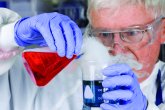×


We have detected your country as:
Please click here to go to the USA website or select another country from the dropdown list.

{image_1}Most of us have been at a business conference or traveling when we meet a great person, but run into a language barrier. We can share no more than a simple “Hello,” “Shalom,” or “Bonjour” before parting ways. Israel’s CelloTrip plans to change that and open the world to multilingual “street talk,” by letting people send a one-line text message and receive a translation seconds later with its phonetic pronunciation.
Continue Reading »
{image_1} There’s nothing good about a broken leg, or, maybe there is. A technology for resetting fractures and lengthening limbs is being adapted to treat not only severe bone injuries, but disproportionate limbs due to congenital defects, accident, or illness. The new treatment, developed by Israel’s Orthogon, enables limb lengthening without suffering.
Continue Reading »
{image_1}In a post 9/11 world, the term “airport security” is synonymous with long lines, delays, and random suitcase inspections. Now there is a possibility that the notorious delays will be cut shorter. So hopes Ze’ev Harel, CEO of Israeli company Xurity. Founded in 2003, it is part of an incubator run by the Technion-Israel Institute of Technology in Haifa. Harel has an extensive background in X-ray technology, with Xurity being the latest in a series of projects.
Continue Reading »
{image_1}Back in 2002, a leading global advisory firm wrote this astounding statement: “Without Israeli technology, the West will not develop. Many organizations throughout the world, including the American national infrastructure, will not survive for long without constant support from the revolutionary technology coming from Israel.” OnTarget Technology’s Web site affirms this same sentiment: “Israel is the source of highly innovative telecom technologies that consistently attract investments and acquisitions by US companies.” They also list the following outstanding achievements for this small, young country:
Continue Reading »
{image_1}Israel isn’t the only country hurting for water. In Antarctica, the driest continent on earth, the scientists working on global warming need water. When the waves of the 2004 tsunami destroyed wells, the people of Maldives needed drinkable water, as well as the refugee camps of Moldova and Albania and 1.3 billion in China. A small Israeli company, based in the Galilee, has been offering its technology to all these countries and more—with portable desalination units.
Continue Reading »
{image_1}Now that the electronic data revolution has hit home, cable “spaghetti” is starting to take over, but there is a way out of this tangled mess. Powermat, led by CEO Ran Poliakine, has developed a system whereby the electrical devices in your home or office will get their power not from a plug, but right off the table you’re working on. Electromagnetic waves are used similar to the ones used with popular Radio-frequency identification (RFID) tags, such as are used to keep track of endangered species in the wild with a chip. However, that technology has been limited to collecting or sending data—until now.
Continue Reading »
{image_1}When the SARS (severe acute respiratory syndrome) epidemic broke out in 2002, Israeli scientist Dorit Arad was alarmed. One of the problems with this disease was diagnosis, which was expensive, slow, and had a high rate of false positive results. What was needed was a new diagnostic tool that could let doctors diagnose potential pandemic illnesses on site, in minutes. Arad’s new breakthrough diagnostic tests for viral pandemics, and a range of other illnesses such as Cytomegalovirus (CMV), meningitis, influenza, and even the common cold, are now going through proof of concept and could be out on the market in 18 months.
Continue Reading »
{image_1}Israel’s Arbel Medical hopes hopes that its IceSense technology will pave the way for simple cryotherapy, a method of surgery that uses extreme cold to kill diseased tissue. “At present there are no non-invasive treatments for benign breast lumps,” says Didier Toubia, CEO of the Yokneam-based company. IceSense offers the hope of efficient treatment in local clinics without the need for hospitalization, recuperation, or scarring.
Continue Reading »
{image_1}Shai Pinczewski is the founder and CEO of waste disposal company REN Waste, a state-of-the-art treatment plant that he claims can rid the world of municipal trash by transforming it into recycled material and electricity. Municipal waste is an environmental hazard that pollutes air, land and groundwater resources, causes health hazards, and costs world consumers billions of dollars a year. With REN Waste, garbage and sewage are bought to the plant, shredded, run through magnetic sorters, separated, and tipped into a bio-chemical oxidation chamber for seven days for aerobic digestion. After fermentation, a pyrolysis plant breaks down waste rubber, plastics and unfermentable organic matter. By the end of the process, the waste has been separated and segregated into component materials and concentrated to a high degree of purity.
Continue Reading »
{image_1}When two middle-aged American men paid a visit to doctors at the University of Michigan Medical Center, they could barely walk for more than five to six minutes at a time. Both suffered from blocked arteries in their legs. Balloons or stents could not help, and they were likely to lose their legs. Instead, they took part in a trial of a new form of cell therapy developed by Israeli company MultiGene Vascular Systems (MGVS), and now both are up and about.
Continue Reading »All logos and trademarks in this site are property of their respective owner. All other materials are property of Bridges for Peace. Copyright © 2025.
Website Site Design by J-Town Internet Services Ltd. - Based in Jerusalem and Serving the World.